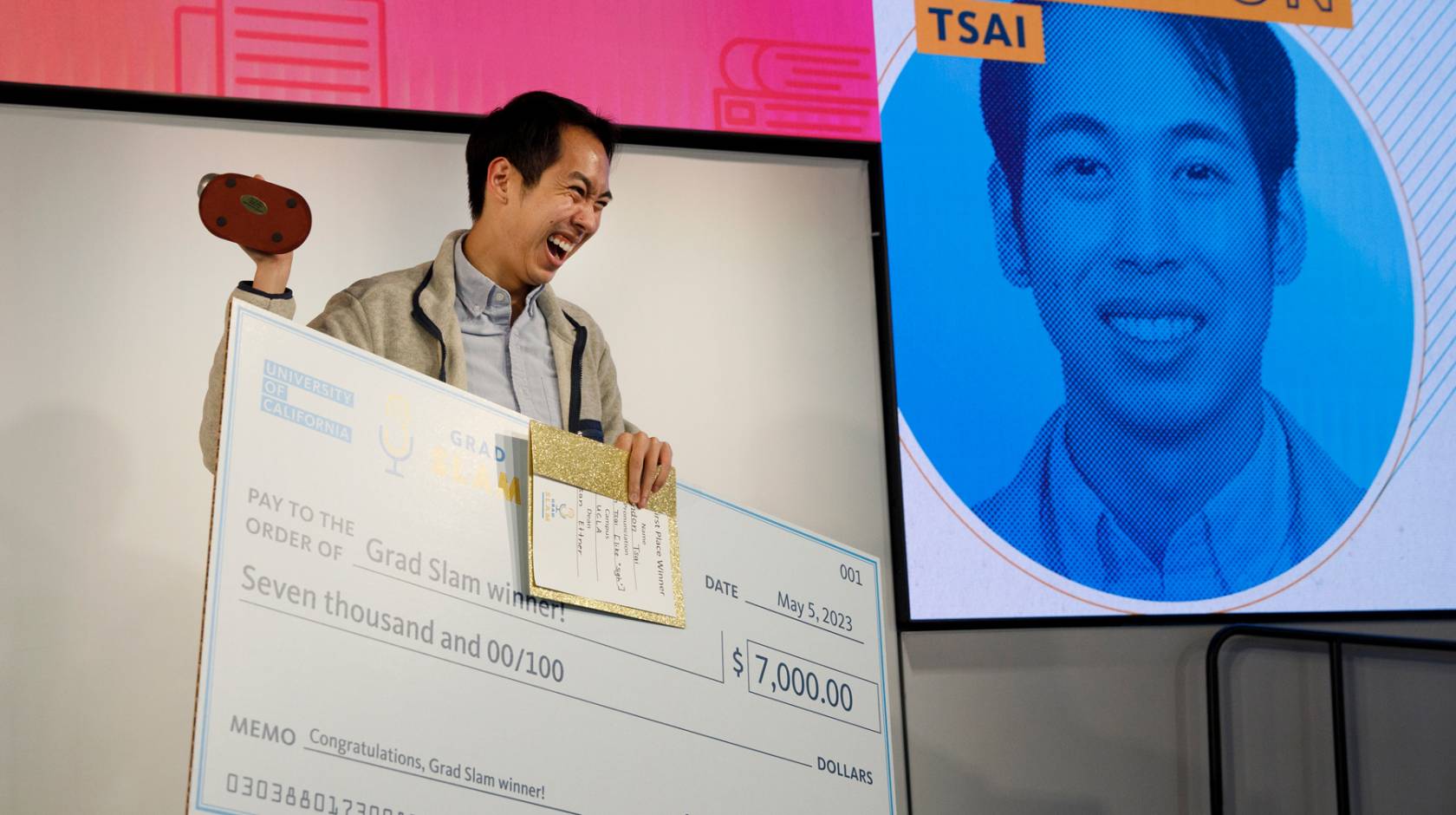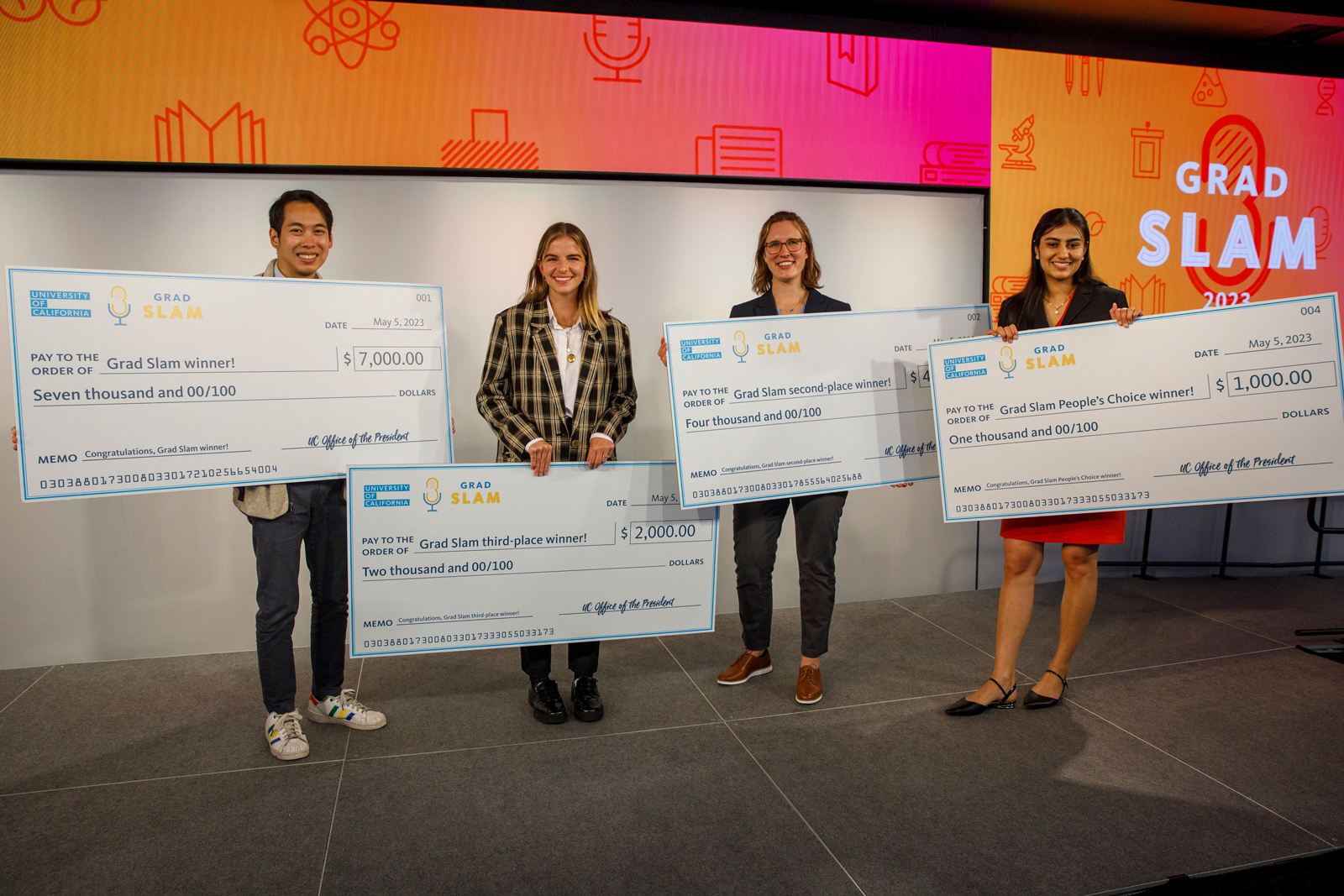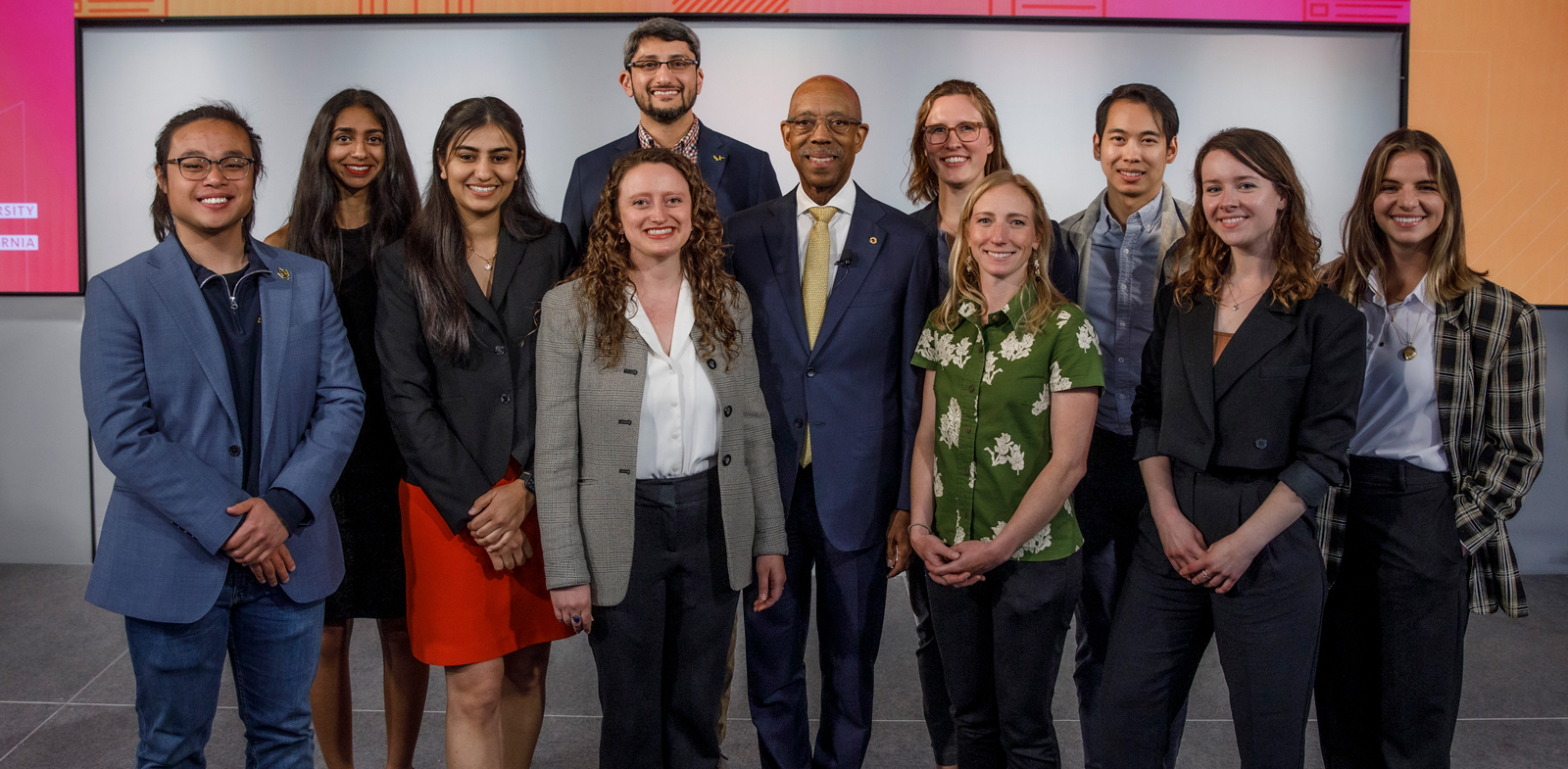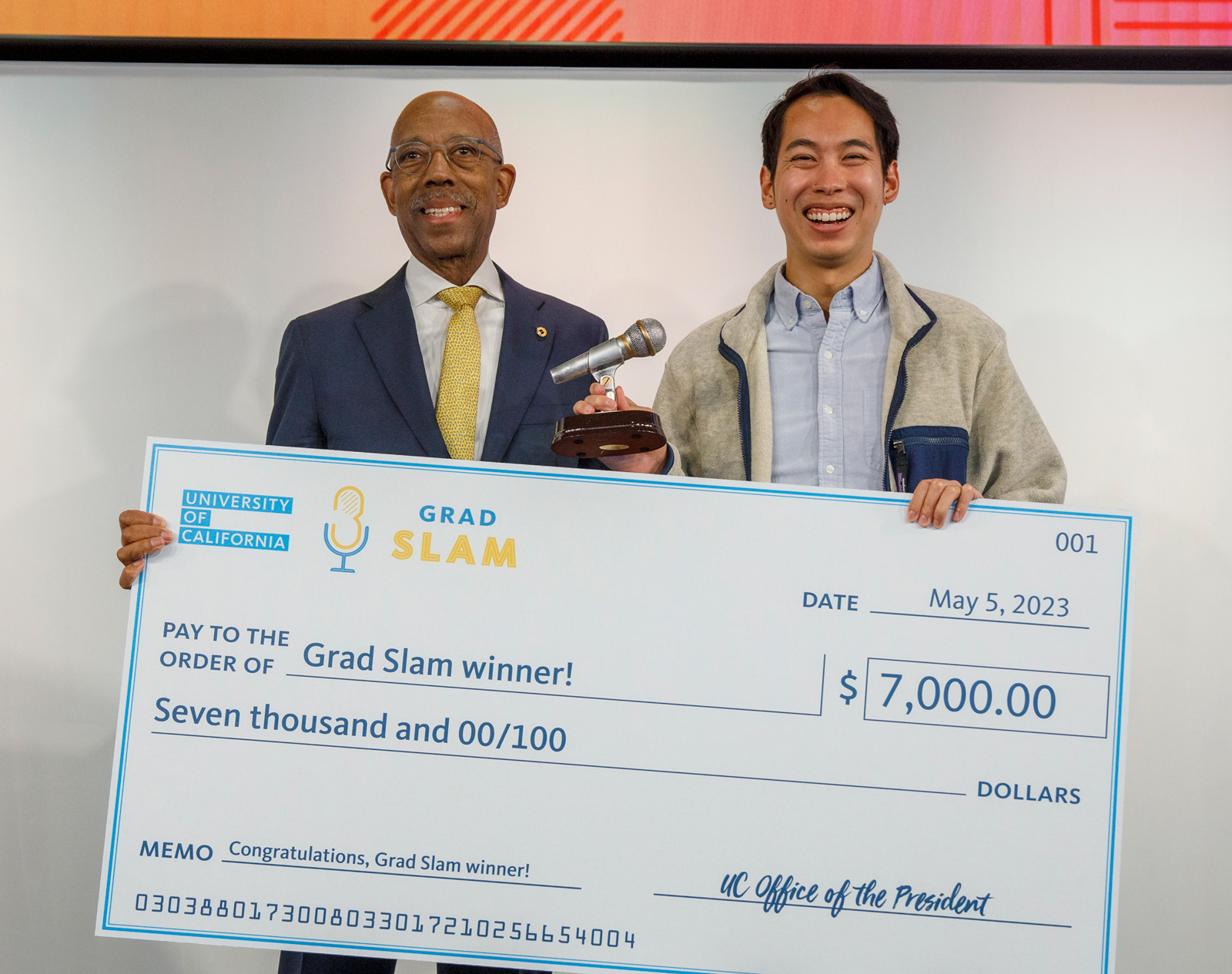Robyn Schelenz, UC Newsroom

It’s a frustrating question for many Americans: How did I get Covid when I received all the vaccines and boosters available?
A discovery by UCLA medical student Brandon Tsai offers a solution to this problem. His three-minute talk on how a new design for Covid vaccines could target nearly every variant won him the systemwide UC Grad Slam on Friday, May 5 at the LinkedIn headquarters in San Francisco.
To earn the title Grad Slam champion and $7,000 in prize money, Tsai offered a peek under the hood at what goes into our current Covid vaccines. The term “spike protein” entered mainstream vocabulary in 2020 as scientists, and the public, learned about the SARS-CoV-2 virus. While those little spikes extending from the Covid molecule eventually made for a ready vaccine target, they aren’t particularly stable. Analyzing DNA sequences of one million Covid samples, including data from every variant, Tsai found many mutations among the spike protein that foil our vaccination efforts. But he found far fewer mutations among a fundamental protein known as polymerase.
Because polymerase is the protein responsible for making virus particles, any mutations to it will likely cause the virus to die. Looking at other coronaviruses, including those responsible for SARS and the common cold, Tsai found the same pattern — polymerases are much more stable than spike proteins.
“By vaccinating against proteins that rarely mutate, we can adjust to one of the biggest problems we are facing with COVID right now, which is different variants bypassing our vaccines,” Tsai explained. “I’m talking about one vaccine that works for every variant, past, present and future.”
His discovery is so promising that academic, biotech and pharmaceutical labs have already begun research into the development of his approach to vaccines, Tsai said. As UC President and Grad Slam emcee Michael V. Drake, M.D., noted in a brief interview with Tsai after his talk, this may just be the beginning of a very lucrative career.
Tsai’s work, and that of the nine other extraordinary contestants, embodied what Grad Slam is all about — sharing a glimpse of the groundbreaking graduate research happening across UC to address some of our most pressing problems.
Celebrating its eighth year, the Grad Slam competition presents emerging scientists and scholars with a unique challenge: distill their life’s work into a three-minute talk that will enlighten and entertain a general audience. The ultimate goal is not just to wow viewers for one morning — it’s to help graduate students build communication skills to make it easier to land jobs, get research funding, and demystify science, all while offering the public a fun and accessible window into what graduate school is all about.
‘We are all the winners’
Each of the 10 contestants had already won their campus Grad Slam competition before heading to the UC-wide finale. Joining Tsai in the winner’s circle at LinkedIn were three other competitors: Julia Mouat of UC Davis took home second place for her talk on how our grandparents’ habits genetically influence our health today, while Elissa Monteiro of UC Riverside snagged third for her presentation on how to identify and provide support to elementary school students who struggle with executive functioning, an umbrella term for skills related to organization and focus. Aneelman Brar of UC Merced won the People’s Choice award for her spirited presentation on a method of recycling carbon that requires far fewer resources.

“I’ll be honest, in the beginning I was a little reluctant to do this!” Brar said, laughing. “I had my dissertation coming up, but I’m glad I did it. I feel amazing. Irrespective of the results, we are all the winners and all the performances were amazing. It’s a tough job for the judges for sure.”
Contestants took to the LinkedIn stage to be evaluated by a distinguished panel of judges, including the chair of the UC Academic Senate, Susan Cochran, and UC Regent Ana J. Matosantos. A representative of the next generation of potential scholars and scientists, Sergio Sanchez of Gateway High School, also joined the panel. Sanchez is headed to UC Davis in the fall to study biochemistry and molecular science and enjoyed the experience. “It gave me insight into what I want to do and reinforced the idea of pursuing medicine.”

Grad Slam is not just a preview of the fruits of research; it also gives viewers a sense of just how hard graduate students work. Reaching the finals was particularly sweet for UC Irvine Ph.D. student Muhammad Twaha Ibrahim, who had previously tried to make the Grad Slam final three times. His talk described a solution for improving collaboration among surgeons working together remotely and in-person at the operating table, smoothing the experience for them and improving outcomes for patients.
Ibrahim is a big booster of the Grad Slam experience, especially for international students like himself, who need to explain their research across cultures. “I’ve learned a lot about the importance of communication. It’s not just about language, it’s also about your gestures and expressions,” he said. He never gave up trying to get through his campus competition to make the UC Grad Slam final, improving his talk each time. “What’s the worst that can happen? You won’t win, but you will learn something every single time. It’s the best opportunity I think you will get to learn about research across campuses and step out of your lane.”
A supportive environment
Even though $14,000 in prize money and rights to the Grad Slam award, affectionately known as the “Slammy,” were on the line, the overwhelming feeling at the event among contestants was one of camaraderie. Third-place winner Elissa Monteiro was a little nervous to come to the systemwide Grad Slam — after experiencing such a generous environment on her campus, she wondered if the atmosphere at LinkedIn would be the same.
“The UC Riverside Grad Slam was such a supportive, iterative process — we gave each other high fives and feedback. We all had to be here at 7 a.m. today, but everyone was still nice, before their coffee!’ she laughs. “It was a really good group of students supporting each other, giving each other thumbs up, it was a great experience.”
Christa Seidl of UC Santa Cruz, who delivered a talk on protecting native Hawaiian birds from malaria that began with a rush of bird song, followed by the stillness of forests impacted by avian disease, had a similar experience. “Even though I was in theater as a kid, as I advanced in my graduate career, I was really fascinated by my work but also developed this anxiety about communicating my complex ideas to an audience.
“So, I challenged myself to address those fears through Grad Slam. I’m really proud of myself for getting this far and thankful for how supportive the community has been. I’m starting a new job soon that will be doing exactly what my research described, and I’m already using the skills I learned from Grad Slam to talk to the public about mosquito control in a way that’s concise, approachable and humble.”
The importance of science communication was not lost on the contestants, particularly those in public health. “I’ve always been a big proponent of popularized medicine,” Tsai said, describing his research. “There’s been a lot of damage between the relationship of the public and their perceptions of vaccines and the researchers who work on the vaccines. Through popularizing medical research, we can try to repair that relationship, in hopes that by describing the science, more people are open to the idea of vaccines and medicine.”
The opportunity to be among peers and colleagues equally passionate about research and its potential impact was edifying to Tsai as well as the other contestants. “Getting to interact with students from all the other UCs, I don’t think there’s a platform quite like this,” Tsai said.
“No matter the results, you get to meet so many wonderful people through doing Grad Slam,” second-place winner Julia Mouat said after the event, offering her encouragement to future Grad Slam participants across the campuses. “It’s been a great experience.”
“Once you are there, if you love your research and have passion, you will be fluent,” Brar added. She has one message for future Grad Slam-ees:
“Go for it!”

Brandon Tsai, right, stands next to Grad Slam emcee and UC President Michael V. Drake, M.D., who helps him hold his giant winning check.

